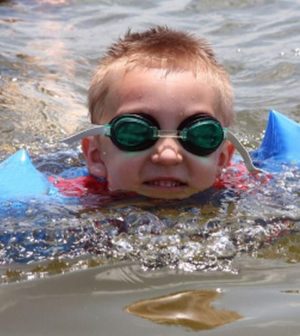- Recognizing the Signs of Hypothyroidism
- 10 Strategies to Overcome Insomnia
- Could Artificial Sweeteners Be Aging the Brain Faster?
- Techniques for Soothing Your Nervous System
- Does the Water in Your House Smell Funny? Here’s Why
- Can a Daily Dose of Apple Cider Vinegar Actually Aid Weight Loss?
- 6 Health Beverages That Can Actually Spike Your Blood Sugar
- Treatment Options for Social Anxiety Disorder
- Understanding the Connection Between Anxiety and Depression
- How Daily Prunes Can Influence Cholesterol and Inflammation
Could Kids Swim Their Way to Better Vocabularies?

Kids may be able to swim their way to a deeper vocabulary.
That’s the takeaway from a study in which researchers taught 48 kids ages 6 to 12 a few new words before they swam, did CrossFit-type exercises or coloring.
The swimmers did 13% better in follow up tests of the new words — an outcome that did not surprise study author Madison Pruitt, a former college swimmer who conducted the research as a graduate student at the University of Delaware.
“Motor movement helps in encoding new words,” Pruitt said in a university news release.
Pruitt, who also takes CrossFit classes, said exercise boosts levels of brain-derived neurotrophic factor, a protein that’s the “Miracle-Gro of the brain.” She explained why swimming boosted kids’ ability to learn new words, while CrossFit did not.
It’s about the amount of energy each exercise demanded of the brain, Pruitt said. Swimming is an activity the kids could do without much thought or instruction. But because CrossFit exercises were new to them, they needed to learn the moves, which required mental energy.
Pruitt is now a speech and language pathologist at a South Carolina elementary school, where she uses her findings about exercise and vocabulary to help her students.
“My sessions are very rarely at a table,” she said. “I’ll take my kids out to the playground or we’ll take a walk around the school.”
Study co-author Giovanna Morini is an assistant professor of communications sciences and disorders, and Pruitt’s adviser on the study.
“We were so excited about this study because it applies to clinicians, caregivers and educators who can put it into practice,” Morini said in the release. “It’s simple stuff, nothing out of the ordinary. But it could really help boost the outcomes.”
The findings were recently published in the Journal of Speech, Language and Hearing Research.
Morini’s department is currently conducting a similar experiment with toddlers.
More information
The American Speech-Language-Hearing Association outlines typical speech and language development.
SOURCE: University of Delaware, news release, July 26, 2021
Source: HealthDay
Copyright © 2026 HealthDay. All rights reserved.










